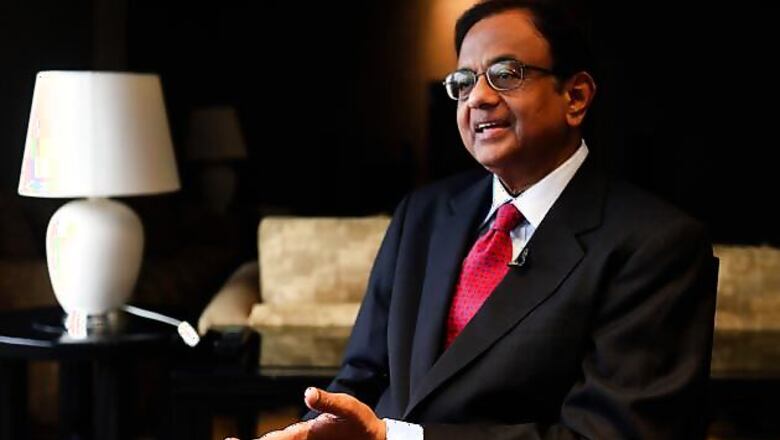
views
New Delhi: Finance Minister P Chidambaram is planning to cut the public spending target for fiscal 2013/14 by up to 10 per cent from this year's original target, in what would be the most austere budget unveiled in recent history as he tries to avert a sovereign credit downgrade.
Chidambaram has already slashed actual public expenditure in the current fiscal year that ends in March by some 9 per cent from the original target. So the plan for 2013/14 would in effect keep a lid on spending, limiting it to a similar rupee level or slightly higher.
Final figures have not yet been worked out. But several officials involved in preparations for the budget to be unveiled on February 28 told Reuters that Chidambaram is determined to rein in the fiscal deficit, having won reluctant agreement from leaders of his Congress party who had wanted a spending spree ahead of the general election due by next May.
Top Congress leaders - including the welfare-minded party chief Sonia Gandhi - did not show up for a pre-budget briefing by Chidambaram on Thursday, signalling that they had fallen in line with his plan, a senior party official told Reuters.
Critics warn that at a time when both private investment and consumer demand are weak, lower public spending risks deepening India's sharpest economic slowdown in a decade. Growth in 2012/13 is estimated at 5.0 per cent, the lowest since 2002/03.
But Chidambaram has argued that a lower fiscal deficit will not only avert a rating downgrade threat but also bolster economic growth prospects as borrowing costs for private investors will fall, helping lift capital investment growth from a five-year low. He told party colleagues at Thursday's briefing that he was confident of taking growth back to 6-7 per cent in 2013/14.
New Delhi missed its 2011/12 fiscal deficit target of 4.6 per cent of gross domestic product by 1.2 per centage points, prompting threats of a downgrade from ratings agencies Fitch and Standard & Poor's.
India has a BBB minus rating with a negative outlook from both S&P and Fitch, the lowest investment grade among the BRIC group of large emerging economies. A cut would take the country's credit rating to junk status.
In a measure of what Chidambaram is aiming to achieve by placing a lid on expenditure, spending for the 2012/13 budget was increased by 13 per cent compared with actual spending in 2011/12.
"Our first and foremost priority is to avoid a ratings downgrade," said one of Chidambaram's lieutenants, adding that a downgrade would further dent corporate investment and hopes for an economic recovery.
The sources declined to be identified because the budget planning has not been been made public.
As Chidambaram prepares to tighten the purse strings, some government departments and ministries are bracing for funding cuts of up to 20-24 per cent from their original 2012/13 targets, which could crimp plans for expansion of the defence forces, rail lines, highways and even development spending on tribal minorities.
"We are literally begging for funds," complained a senior official at the Tribal Affairs Ministry.
Rail, defence cuts
The proposed cuts will likely reduce the outlay for the Railways Ministry by more than $2 billion on top of the $1.8 billion cut it faced this fiscal year.
A senior official at the ministry said that, to compensate, the railways have been asked to raise rail fares and form joint ventures with state-run infrastructure companies.
The ministry needs at least $75 billion to complete ongoing projects related to laying new track, modernising services and improving safety, which are already 10 years behind schedule.
For their part, Defence Ministry officials are worried that budget cuts may delay some important arms procurement plans, as well as a $6 billion project to raise a new battalion on the border with China. The ministry's budget was cut by $1.9 billion in 2012/13.
Chidambaram has promised to achieve a fiscal deficit of 5.3 per cent of GDP this fiscal year and 4.8 per cent in 2013/14, targets he calls 'red lines' that cannot be crossed. Late last year, some economists were predicting that the budget deficit this year could be closer to 6 per cent.
Despite his austerity drive, Chidambaram - seen by some as a potential candidate to become prime minister in 2014 - has not lost sight of politics ahead of the looming elections.
Officials say he will use the spending cuts to make headroom for the rollout of a proposed food security law. A populist bill that will expand supply of cheap grain for the poor is likely to be implemented this year at a cost of $22.27 billion to the exchequer.














Comments
0 comment